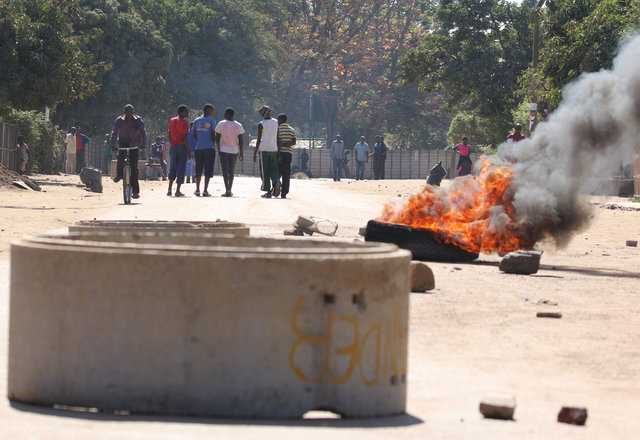Zimbabweans stay at home in protest against economic hardships

By Reuters
Zimbabweans stayed at home on Wednesday and foreign banks and most businesses in the capital shut down, in one of the biggest protests against high unemployment, an acute cash shortage and corruption for nearly a decade.
Evan Mawarire, a pastor whose social media movement #ThisFlag organised the “stay-away”, demanded that President Robert Mugabe fire corrupt cabinet ministers and scrap plans to introduce local bank notes or face a two-day shut-down next week.
Wednesday’s protest followed violent clashes between taxi drivers and police on Monday that led to the arrest of 95 people. It also coincided with a strike by doctors, teachers and nurses whose salaries had been delayed.
A devastating drought has compounded economic hardships including high joblessness while an acute cash shortage has angered Zimbabwe’s citizens.
In a story quoting John Mangudya, the governor of Zimbabwe’s central bank, the Financial Times reported on Wednesday that the African Export-Import Bank was arranging a seven-year loan of $986 million so Zimbabwe could pay back arrears to the World Bank.
The FT quoted Mangudya as saying Zimbabwe hoped to pay off its arrears before the September board meetings of the International Monetary Fund and the African Development Bank, paving the way for IMF assistance to alleviate its cash crunch.
Afreximbank and IMF officials could not immediately be reached for comment.
CAMPAIGN ATTRACTS THOUSANDS
The 39-year-old Mawarire started the #ThisFlag campaign in April to protest against corruption, injustice and poverty.
The campaign has attracted thousands of followers who have been speaking out against government excesses. Wednesday’s protest was organised via Twitter, Facebook and WhatsApp.
Mawarire’s campaign includes a series of demands: for Mugabe to fire and prosecute “known” corrupt ministers, for government salaries to be paid on time and for police to remove roadblocks which most people say are posts for bribe taking officers.
“The ball is in your court,” Mawarire said on his Facebook page. We are ready to close down again and this time we will add another day, Wednesday and Thursday. We are not playing and we ask you to take us seriously.”
Mugabe’s spokesman, George Charamba, was not available to comment.
State telecoms regulator POTRAZ said in a statement it would arrest people sending “subversive” messages that cause unrest.
Mugabe, who has held power since Zimbabwe gained independence from Britain in 1980, was attending a scheduled meeting on Wednesday of his party ZANU-PF’s politburo, the party’s top executive organ. Party spokesman Simon Khaya-Moyo declined to say whether ZANU-PF would discuss the protests.
In the volatile township of Mufakose, to the west of Harare, hundreds of youths barricaded roads to keep people from going to work, Reuters witnesses said.
More than 40 people were arrested across Zimbabwe for blocking roads and disturbing the peace, said Charity Charamba, a police spokeswoman. Among them was a Belgian tourist held in the resort town of Victoria for unlawful protests, she said, correcting her earlier statement that an Australian had been detained.
There was no need to call out the military, Charamba said.
“The military is not there because in our assessment, for now, the situation has not deteriorated (enough) to warrant the presence of the military,” Charamba told reporters.
Local units of Barclays and Standard Chartered shut their branches in central Harare. Clothing retailers Edgars Stores and Truworths closed stores.
Siyaso, one of the biggest and oldest informal markets in Mbare township near central Harare, was also shut down. Few vehicles were on the roads of the capital. Supermarkets like Pick’n’Pay, Ok Zimbabwe and Choppies reported little business. Government departments were open.
Local private media said Zimbabweans in other major cities had also stayed at home, with most businesses closed. Zimbabwe last witnessed such a protest in April 2007.